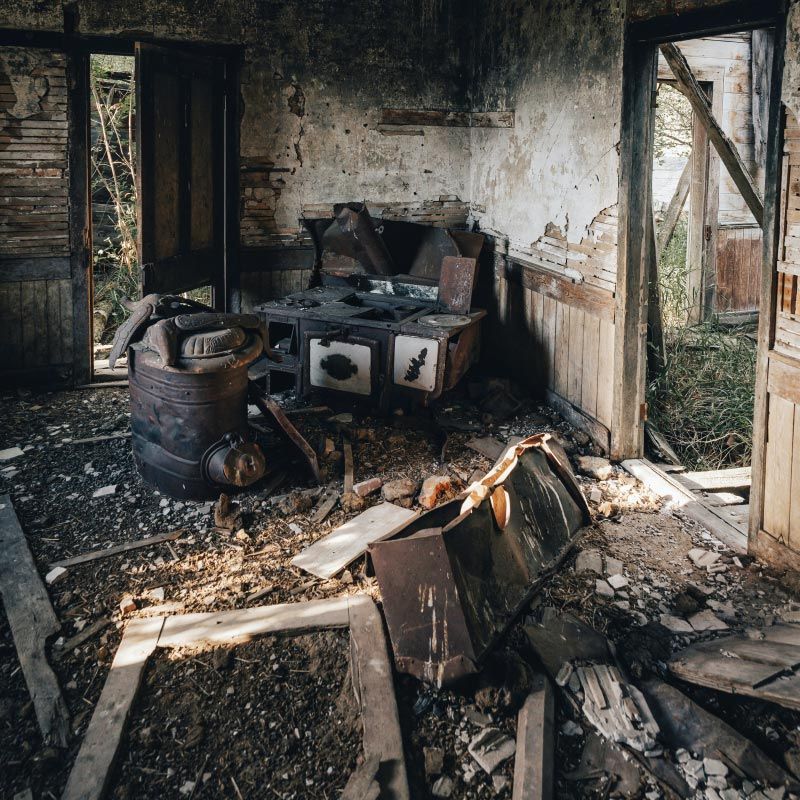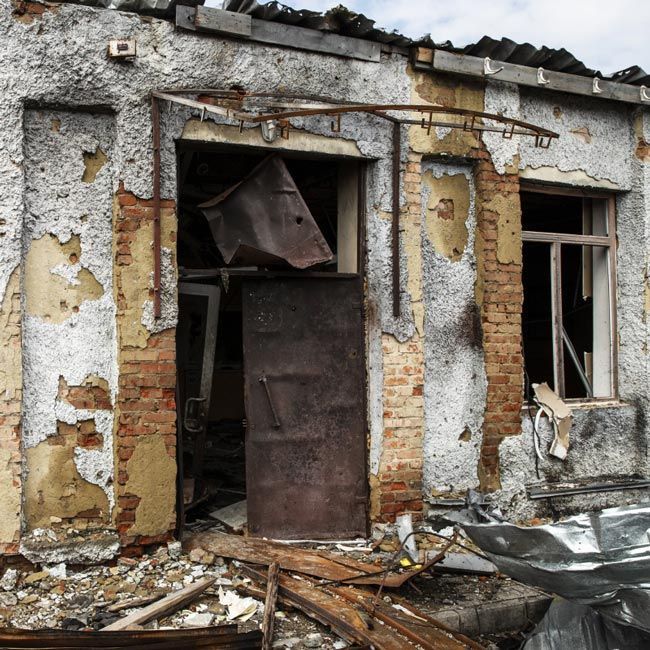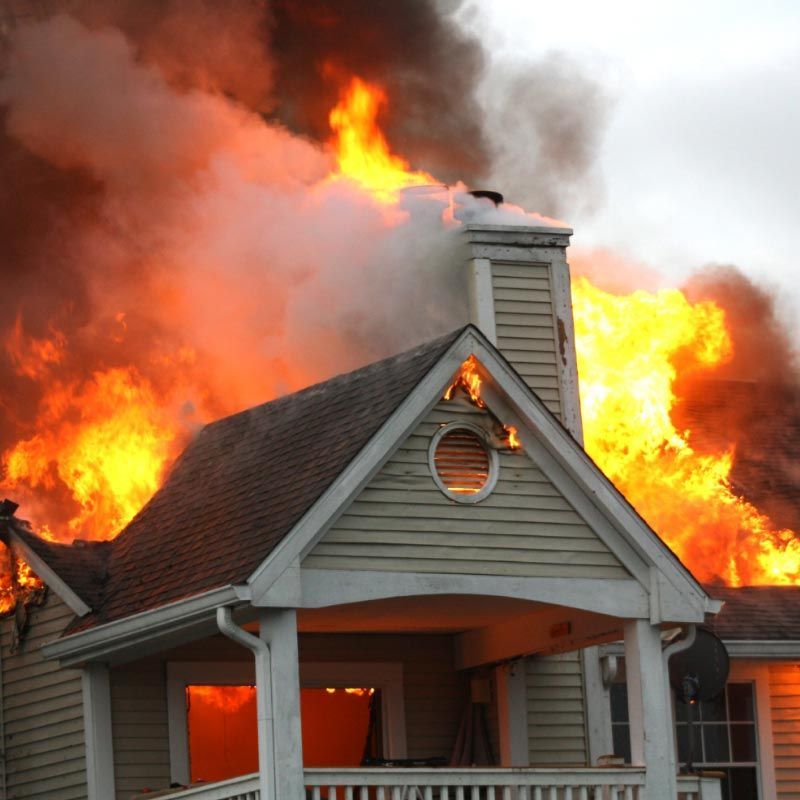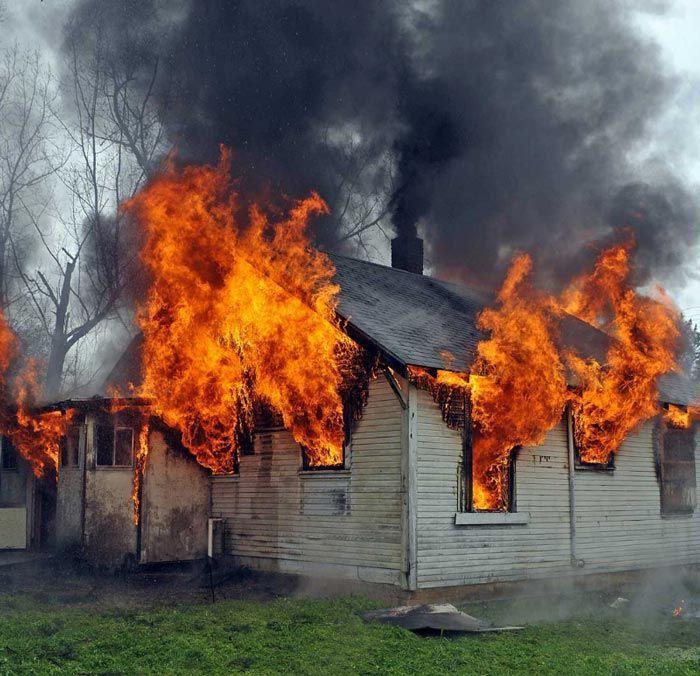House Fire Insurance Payout: How to Maximize It
Free Offer Form
We will get back to you as soon as possible.
Please try again later.
Selling a fire damaged house is possible, though may be difficult with a real estate agent. Selling as-is to a National cash buyer is one of the best options. Fill out the form below to get started and find out what your property is worth.
While a fire tragedy is undoubtedly devastating, having a reliable insurer can be the first step towards rebuilding your life.
A house fire insurance payout is the amount your insurance company will pay you after a fire.
After receiving your insurance payments, you have two choices: either rebuild or sell your fire-damaged property.
But before deciding, learn everything about this payout with the following tips — from the basics to filing a fire claim and getting your payout.
The Basics of House Fire Insurance
Also known as a house fire protection plan, it is a written agreement that forms a safety net between you and your insurer.
It's essentially a contract that ensures insurance companies will compensate you for the loss of use of your property up to an agreed-upon amount.
Understanding House Fire Insurance Policies
If your home catches fire, a homeowners' insurance policy will pay for the cost of repairs or rebuilding and replacing any damaged personal belongings.
It may also cover the cost of temporary housing if your home is uninhabitable.
To understand what your house fire protection covers, take note of the following:
- Loss of Use: They compensate for the loss of use of your property, including additional living expenses, if your home becomes uninhabitable.
- Property Damage: They address fire damage to both the structure of your personal property and belongings.
- Standard Coverage: It focuses on the destroyed property's reimbursement cost minus depreciation.
- Fire Insurance Policy Limits: Policies differ due to factors like protection, building type, and insured activities. Common exclusions include war, loss of employment, theft, or the insured party's negligence.
- Specific Property Exclusions: Some items like accounting records, currency, deeds, and securities are often excluded from coverage or deemed uninsurable.
- Cancellation and Replacement: Either party can cancel the policy with prior notice. Some policies allow insurers to replace or rebuild the damaged property instead of making a cash settlement.
NOTE: Policies can vary, so be sure to review yours carefully before making an insurance claim.
Basic Coverage Included in Fire Insurance Policies
The amount of claim you need will depend on the value of your home and personal belongings.
Basic coverage typically includes property damages caused by fires, smoke, lightning, and explosions. It may also include other expenses if you are temporarily displaced due to the fire.
Insurance companies can offer different policies, so it's important to understand yours.
- Property Damage: Providers cover all unintentional fire loss, including your home, personal possessions, and structures—both interior and exterior fire damage.
- Smoke Damage: This includes cleaning and repairing items affected by smoke.
- Lightning Damage: A home insurance claim often includes payment for damages caused by lightning strikes, which can result in fires or electrical damage.
- Explosions: Policies may also cover claims payout to personal belongings resulting from explosions, especially related to a fire incident.
Wildfires: In regions prone to wildfires, insurers may offer specialized wildfire assistance or endorsements to enhance an insurance claim for this specific risk.
Can I Sell a Fire Damaged House National?
Yes. You can sell a fire-damaged house. However, it may be harder to sell in the local National real estate market in as-is condition. You would have to make repairs and possibly rebuild most parts of your house before a buyer takes interest in the property. Your best option when selling a fire-damaged house is a cash buyer. They buy burned houses as-is so you don't need to spend money on repairs. They'll handle all the cleanups and renovations for you, however, expect that their offer may be below the cash value of your property.
The Process of Insurance Payout After a Fire
After familiarizing yourself with your fire protection plan's limits and coverages comes the process of getting your payout.
When dealing with the aftermath of a fire, interacting effectively with insurance adjuster can significantly impact the outcome of your fire claim.
Reporting the Incident to Your Insurer
The first step after a house fire is promptly reporting the incident to your insurance company.
Call your insurance company as soon as possible. The sooner you report the fire, the sooner the insurance company can start the claims process.
When you contact your insurance company, tell them the date, time, how, and where the fire happened. Also, describe the fire damage. Take photos and videos to serve as physical evidence.
One of the duties of landlords is to promptly provide any requested information to their insurer, such as building maintenance records or inspection reports—whatever is needed for the entire claim process.
Fire Damage Assessment
Once the claim is submitted, your insurance company will send their own adjuster to assess the extent of the damage.
This evaluation determines the monetary value of your payout.
The insurance adjuster will take steps following a residential fire to conduct a thorough damage assessment.
- Document the damage with photos and notes.
- Estimate the cost to repair or purchase replacements
- Review policy coverage.
- They will conduct an interview with you if necessary.
- Offer recommendations based on their assessment.
Claim Settlement Process
If the adjuster is satisfied, your insurance company will approve your claim and provide compensation for the covered damages.
The insurance provider calculates the payout based on the adjuster's assessment, policy coverage, and any deductibles.
You can negotiate with a mortgage company and the adjuster to try to get a higher average clause or settlement offer. This is where an experienced claims adjuster can be very helpful.
If you agree with the adjuster, the payout will be released shortly. Otherwise, you'll have to initiate an appeal process.
Impact of Fire Severity on Insurance Payout
The severity of a fire significantly impacts your claim's payout. Repairing your home takes time and can be costly, especially if you need alternative housing during repairs.
If your claims' policy includes replacement cost coverage, your insurer will cover the full cost to replace or repair your damaged home.
Conversely, if you're underinsured, you may receive an insufficient average clause or payout.
Typically, home insurance companies pay the mortgage lender directly and send you a check for your portion of the loss, depending on your dwelling coverage (replacement cost or actual cash value).
Maximizing Your House Fire Insurance Claim
Skilled public adjusters can help you maximize your insurance claim and prevent exploitation.
If you think you need a higher offer from your insurance company, speak with them about it. Feel free to initiate negotiation or appeal for maximum settlement.
Essential Tips to Maximize Your Insurance Payout
As a fire damage victim, you deserve fair compensation but may need help with your claim.
To avoid insurance fraud, follow these effective strategies for insurance claims to strengthen your claim.
- Notify your company promptly to expedite the home insurance claim process.
- Maintain a detailed list of lost property (if there's any, include your mortgage loan documents) for accurate documentation.
- Retain damaged items as proof of ownership and fire damage.
- Gather evidence of damages and expenses, including photos and receipts from multiple repair estimates.
- If necessary, hire a public adjuster or lawyer.
Addressing Underinsurance and Coverage Limits
Underinsurance means insufficient coverage and can potentially cause financial strain. Coverage limits and adjusters' decisions can limit funds for fire insurance claims.
Also, know that replacement cost coverage is more comprehensive, covering new item replacement, while actual cash value payment considers depreciation.
To avoid underinsurance, understand the coverage limits and deductibles in your policy.
The Process of Selling Fire Damaged Property to a Cash Buyer
The process of getting a cash offer for a burned house is pretty much the same as any property type. However, it is best if you can contact your home insurance company first before getting an offer for your house after a fire. Your National home insurance company can help assess the extent of the fire damage as well as the repair costs. This can help you decide whether selling a house as-is to a cash buyer is really the right path to take. Once you have decided that you really want to get a cash offer, here are the next steps you should take.
Important note: This doesn't apply to all cash buying companies.
1. Request a Cash Offer
You can easily find cash buyers in your National area by searching online. Once you found a reputable cash buyer, head over to their website to fill out a form or give them a call to ask for a cash offer. Most cash buyers and real estate investors give no-obligation cash offers so you can still ask other cash buying companies how much they can buy your fire-damaged property. If you are unsure about the background of a cash buyer, you can always ask them for proof of their source of funds.
2. Welcome the Cash Buyer into Your Home
The cash buyer or real estate investor may want to check your fire-damaged property for the repairs and improvements it needs, especially its roofing, walls, foundation, etc. You won't have to pay for these repairs when selling a National house to them, but experienced home buyers or real estate investors consider repair costs to make an accurate cash offer.
3. Review the Contract and Sign
Once you accept the cash buyer's offer on your fire-damaged home, they would furnish a sales contract and send it to you electronically. You will be given time to go over the terms and ask questions. After everything is settled, sign the contract to make the deal with the National cash home buyer official.
4. Closing
During closing, expect less paperwork since there are no lenders involved. After you have signed the minimal necessary paperwork and the National deed is transferred to the cash buyer's name, you'll get your cash in your bank account. If you aren't confident attending the closing by yourself, bring a real estate attorney with you.
5. Set Your Preferred Day to Move-Out
If the property has minor fire damage and you are still living in it, communicate to the cash home buyer when you want to move out. This is also a good time to ask for a sale-leaseback agreement if you don't have a place to crash on while you are still looking for a new National home.
The 80% Rule in Fire Insurance
The 80% rule is an unwritten replacement value policy in insurance that every homeowner should understand.
It says your fire damage insurance will only fully cover the exact replacement cost after a disaster if your insurance policy is worth at least 80% of your home's total actual cash value.
Understanding the 80% Rule
The 80% rule in insurance specifies that homeowners insurance should cover 80% of their home's replacement value to receive full coverage benefits in case of a fire damage claim.
Falling short of this threshold may result in reduced payouts.
For example, your property is worth $275,000. You need insurance worth at least $220,000 (80% of its exact value), so if something bad happens, your insurance fully covers any potential claims process.
Implications of the 80% Rule on Your Payout
Falling short of the 80% rule means your home insurance claim money may be less than expected.
For instance, if your home is worth $275,000, you should insure it for at least $220,000 (80% of its value).
Imagine a fire damages your house, with repairs totaling $150,000. Following the 80% rule, your insurance carrier will cover 80% of the repair costs, which amounts to $120,000 in dwelling coverage.
As a result, you'll need enough money to cover the remaining $30,000 out of your pocket. If you have further questions about claims payouts, please don't hesitate to contact your property insurance agent.
Tax Implications of a Fire Insurance Payout
In general, home insurance proceeds are not taxable income. This means you do not have to pay taxes on the money you receive from your fire insurance claim.
However, there are some exceptions to this rule.
When are Insurance Payouts Taxable?
Fire insurance claims are typically not taxable, as they are intended to compensate for fire damage or loss.
However, if the payout includes compensation for additional expenses or losses such as lost wages or emotional distress, those amounts may be subject to taxes.
For example, if the homeowners' insurance policy includes coverage for loss of income and you receive a payout to replace lost income due to the fire, that portion of the pay may be taxable as ordinary income.
It's always best to consult with a tax professional.
How to Report Insurance Payouts on Your Tax Return
Ensure compliance with tax laws by accurately reporting homeowners' insurance payouts on your tax return.
To figure out if you owe taxes or can claim a deduction, you fill out a form called Form 4684. Once completed, you will need to file your tax return.
This form helps you report all the details and determine if your situation is taxable.
It's a bit complex, so you might want help from a tax insurance professional to ensure you do it right.
Frequently Asked Questions
Learn more about fire damage insurance payouts and how they affect homeowners here.
How Long Does It Take To Get a House Fire Insurance Payout?
Most home insurance claims can be settled within 90-120 days if handled correctly. However, homeowners unfamiliar with the process may make mistakes that delay settlement.
The timeline for receiving a fire damage insurance claim also depends on the complexity of the claim.
What if My Insurance Payout Isn’t Enough to Cover the Damage?
If your payout falls short, file an appeal, talk to your insurer, hire a public adjuster, or explore legal avenues as needed.
Aside from these, you may also apply for assistance with FEMA or other state and private organizations for disaster recovery.
They may also offer a free consultation and are experts in state law and legal liability covering this concern.
Can I Dispute the Amount Provided by My Insurer in the Payout?
Yes, you can dispute or appeal the payout amount. If you believe it is inadequate, work with your insurer to address your concerns or seek legal advice.
Insurers and adjusters will typically re-investigate the fire damage claim, so remember to gather evidence.
Does Insurance Cover Temporary Housing After a Fire?
Homeowners' insurance policies often include coverage for temporary housing, also known as additional living expenses (ALE).
Most insurance companies will pay for temporary living coverage while you're getting your home rebuilt.
Many insurance companies' policies include this if your home is uninhabitable due to fire damage. Still, review your home insurance policy.
Will a House Fire Insurance Payout Affect My Future Premiums?
Typically, filing a legitimate fire insurance claim should not significantly impact your future premiums. However, multiple claims or a history of high-risk behavior could lead to premium increases.
When you make a fire damage claim, your home insurance company may perceive you as a higher risk to insure because you've experienced a significant loss.
As a result, insurance companies might increase your premiums to compensate for this perceived risk.
Conclusion
Understanding your home insurance claims process and policy is crucial for a smooth recovery after experiencing house fires.
While these tragedies are devastating, applying for a fire insurance claim can be the first step toward rebuilding your life. Homeowners insurance can help you rebuild.
Additionally, you can sell the fire-damaged property "as is" to buyers who take a financial interest in renovating or rebuilding the land.
National Resources
- Selling a Fire Damaged House National
- Selling Inherited Property National
- Selling a House in Probate National
- How to Sell a House by Owner National
- How to Sell Rental Property National
- Stop Foreclosure National
- Selling a House during Divorce National
- How to Sell a Hoarder House National
- Can You Sell a Condemned House National?
- Can You Sell a House in Foreclosure National?
- How to Sell Rental Property with Tenants National
- Taxes on Selling a House National
Free Offer Form
We will get back to you as soon as possible.
Please try again later.
Author: Chris Charles
We buy fire damaged houses because we like taking on the challenge and making a win win for sellers looking to sell. We work with our partners nationwide and are experienced in dealing with the city if its already been condemned. Request a cash offer to have a chat with us today.
Sell Fire Damaged House for Cash Quick
Sell Your House Fast, To A Legitimate House Buying Company You Can Count On. ✔️ Free, Easy & ✔️ No Pressure Process. Find Out How We Buy Houses!
Sell Fire Damage House in California
Sell Fire Damaged House in Ohio
Sell Fire Damaged House In North Carolina
Sell Fire Damaged House In Michigan
Sell Fire Damaged House In Massachusetts
Sell Fire Damaged House In Colorado
Sell Fire Damaged House In Minnesota
Sell Fire Damaged House In South Carolina
Sell Fire Damaged House In Alabama
Sell Fire Damaged House In Louisiana
Sell Fire Damaged House In New Hampshire
Sell Fire Damaged House In Maine
Sell Fire Damage House in Texas
Sell Fire Damaged House in Florida
Sell Fire Damaged House In New Jersey
Sell Fire Damaged House In Virginia
Sell Fire Damaged House In Indiana
Sell Fire Damaged House In Kentucky
Sell Fire Damaged House In Oregon
Sell Fire Damaged House In Oklahoma
Sell Fire Damaged House In Connecticut
Sell Fire Damaged House In Utah
Sell Fire Damaged House In Rhode Island
Sell Fire Damaged House In Delaware
Sell Fire Damaged House in Pennsylvania
Sell Fire Damaged House in New York
Sell Fire Damaged House In Washington
Sell Fire Damaged House In Arizona
Sell Fire Damaged House In Missouri
Sell Fire Damaged House In Nevada
Sell Fire Damaged House In Iowa
Sell Fire Damaged House In Arkansas
Sell Fire Damaged House In Mississippi
Sell Fire Damaged House In Kansas
Sell Fire Damaged House In North Dakota
Sell Fire Damaged House In Alaska
Sell Fire Damaged House in Georgia
Sell Fire Damaged House in Illinois
Sell Fire Damaged House In Tennessee
Sell Fire Damaged House In Maryland
Sell Fire Damaged House In Wisconsin
Sell Fire Damaged House In New Mexico
Sell Fire Damaged House In Idaho
Sell Fire Damaged House In Nebraska
Sell Fire Damaged House In West Virginia
Sell Fire Damaged House In Hawaii
Sell Fire Damaged House In Vermont






